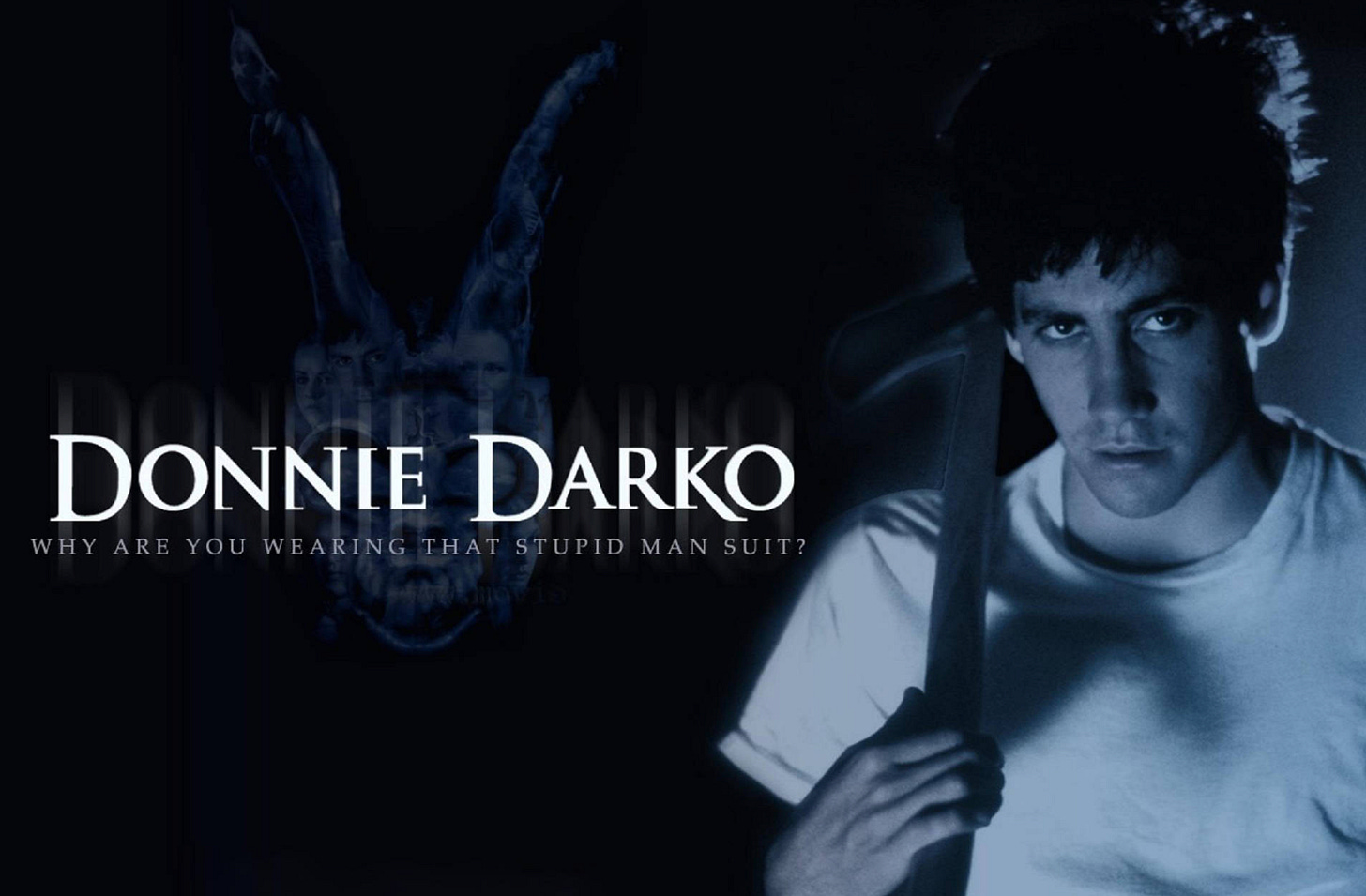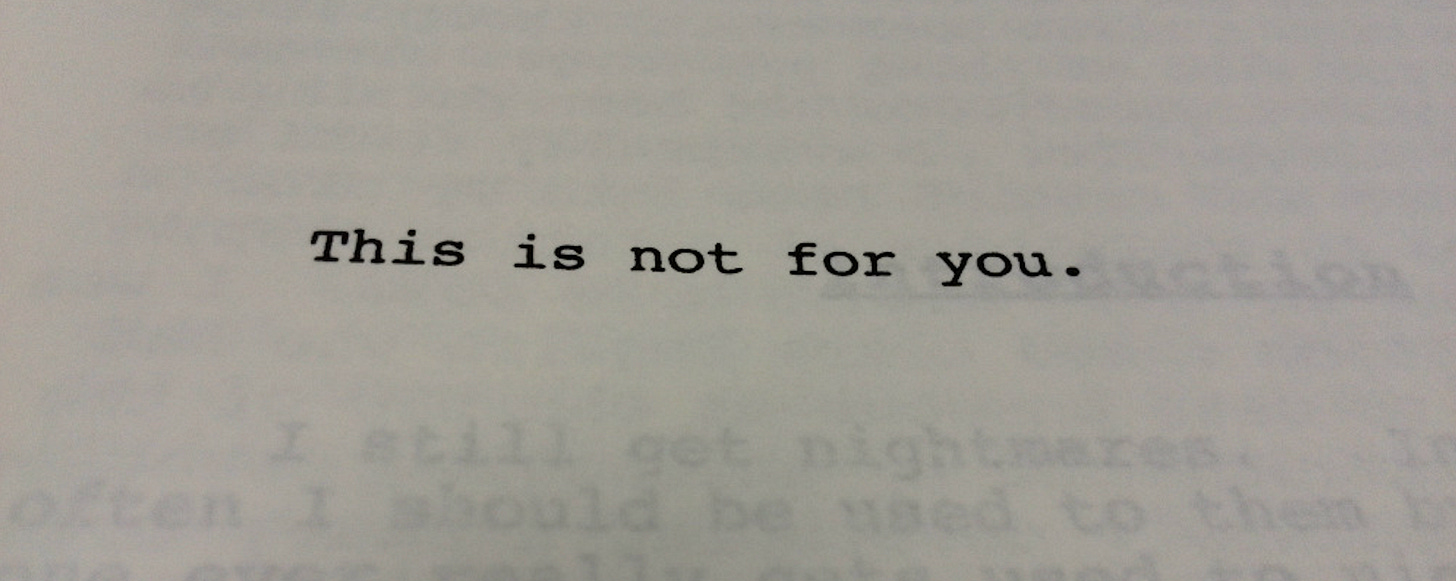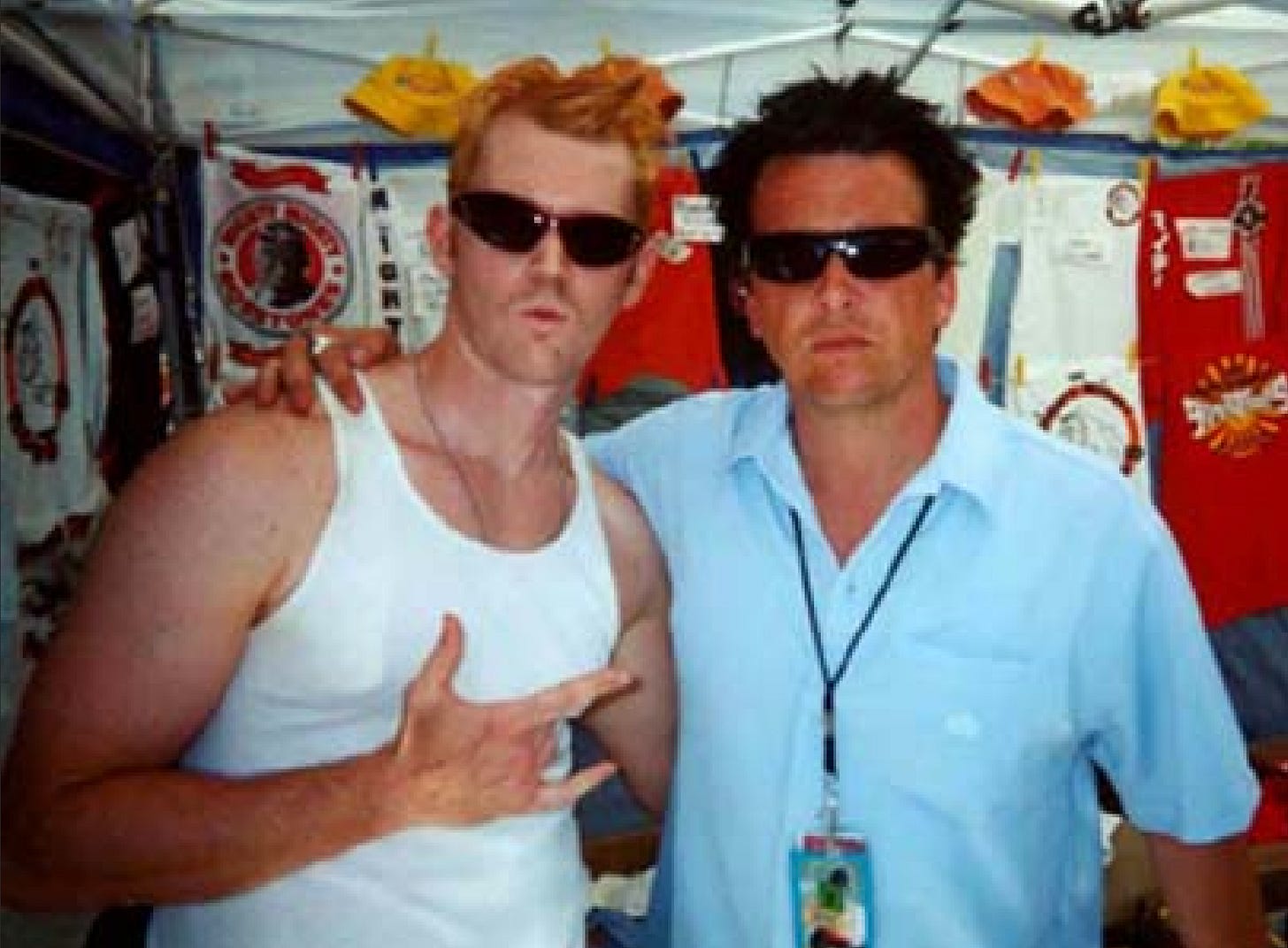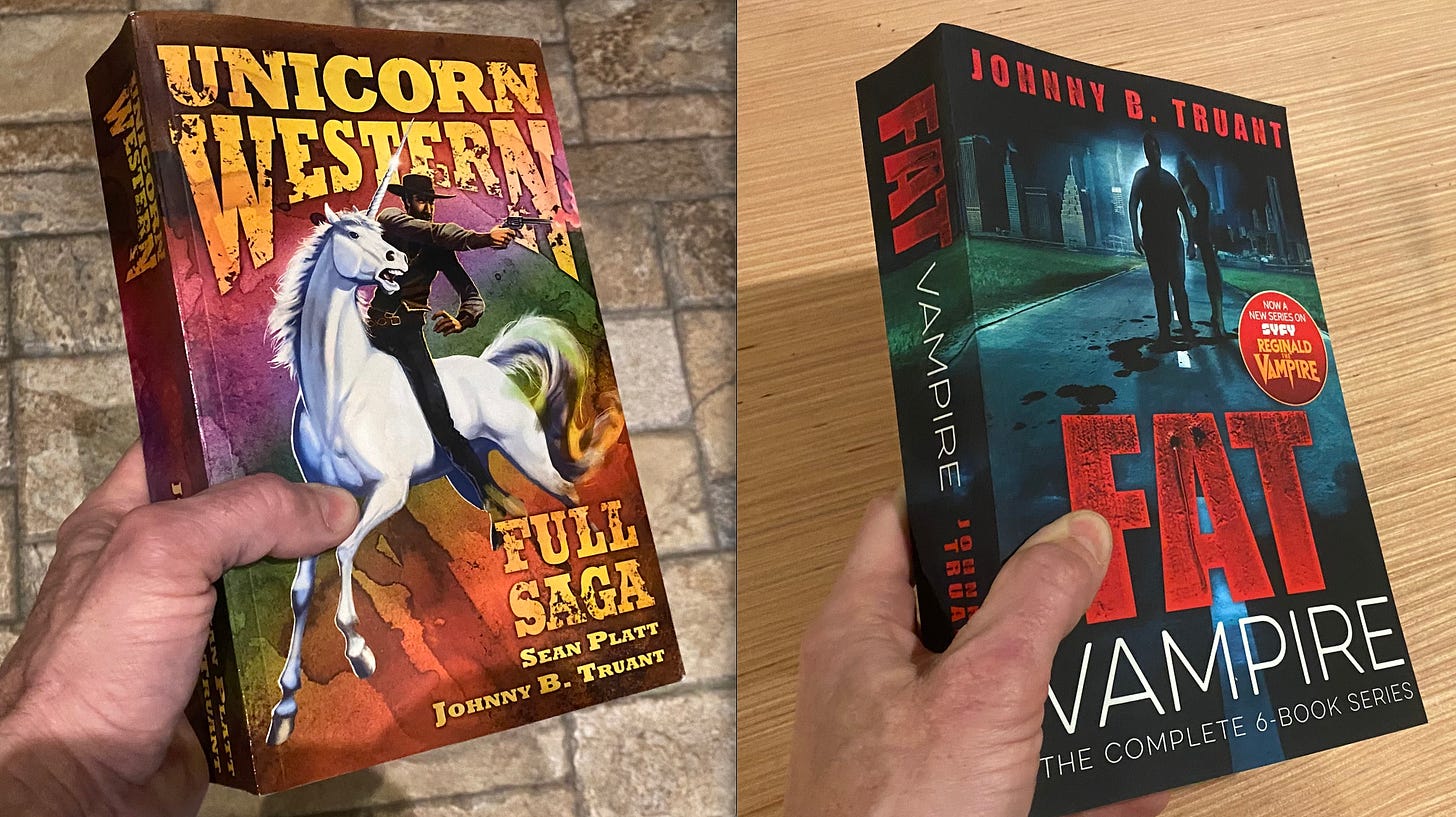The power of the cult-hit author
I'd rather be a cool underground hit than a famous bestseller any day of the week.
I don’t understand why people want fame. The path is long and capricious, relying more on luck more than hustle — and, therefore, almost entirely beyond a person’s control. You have to be in the right place at the right time, born under the right stars. And then, even if you do manage to become famous, the fans are capricious, too. Right now, every one of us could think of a dozen people who were the world’s darling one day, then forgotten the next.
But not too forgotten. Not forgotten enough to start over. After the world is done with you and you’re through being famous, you become infamous. It’s not like you can reset with a normal life. What must it be like for MC Hammer these days? It’s not like he could get a job selling aluminum siding without taking a metric ton of crap from every customer.
Sure, I’ll take the 5-inch vinyl in robin’s egg blue. And by the way, why aren’t your pants more baggy?
Famous people can’t do whatever they want whenever they want. They live under the world’s lens, their perceptions twisted by a life spent around sycophants, critics, and predators. You’re only as good as your last hit, with almost no loyalty to carry you forward. You have to live in fear: fear of losing what you have, of saying the wrong thing and getting publicly shamed, of stalkers and weirdoes. Everyone’s in your business, intruding when you most need privacy. Everyone — from representatives to the masses — spend their everyday telling you what to do.
In the beginning of my author career, I chased popular writing success like so many others. That was what I aimed for: to write a bestseller that everyone in the world would know by name, just like they’d know me by name. And that’s what a huge portion of authors — as a profession with an especially pernicious hive mind — tend to aim for almost by default.
But isn’t that just being famous? I don’t want that. Why the hell did I spend so much time chasing the most difficult goal to for any author to achieve — one that even if I achieved it wouldn’t give me a life I actually wanted?
The Beauty of a Cult Hit
Maybe you read the above and think I’m crazy. Maybe you want to be the next Stephen King, and damn what Truant says. Bestselling authors aren’t the same as movie stars, you’re thinking. Even the best-known authors don’t have the pressures and limitations of Hollywood. And even if they do, so what? Every book they write will be bigger than the last, no matter what they do.
Okay, maybe for Stephen King. King could spit on a napkin and top the Times list. Others aren’t so lucky — especially in self-publishing, where “bestseller” means something very different. Just like we can all name stars who fell from grace, so too can we name authors who burnt out and fizzled away — who rode a very specific road to popularity, then disappeared when their flavor wasn’t in vogue anymore.
I’ve been in this business a long time, watching popular and mega-selling authors come and go. Some of the biggest names in self publishing are gone now, but unlike movie stars on the decline, they’ve basically vanished. Nobody’s singing their praises. Nobody, really, remembers them at all.
Why does it happen? It’s because of that old adage: The bigger they are, the harder they fall. Large popular success sets expectations, and those expectations can be boiled down to a quiet subconscious assumption: The way things are right now will be this way forever.
Today Paulie Shore is hilarious. Today OJ Simpson has a good public image and is loved by all. Today mullets make you look good. Then tomorrow, when those things change, the public collectively steps away and hops aboard something cooler instead. There was a day when Arnold Schwarzenegger flicks were the only movies that mattered. Do we really think that tomorrow, some of today’s biggest popular darlings won’t seem silly — and crash those empires like a dying rocket?
Big success sets big expectations, but big expectations can only be met for so long: about as long as the public’s fickle attention span. Quieter successes, on the other hand — things that never got too big, too cool, or too hip to begin with — appeal to their fans not on trendiness, but for deeper reasons. And that’s why those careers can have real staying power. That’s why cult phenomena, unlike smash hits, tend to stick.
Do you wonder, when you’re listing to that little indie band that nobody’s heard of, whether they’ll fall from fame and cause you to not like them anymore? Of course not. Because they never made it to outright fame, so there’s not far to fall. But more importantly: You didn’t adore them because everyone in the world was adoring them. Instead, you had to seek them out. People my age might have dug “Gangnam Style” simply because that song was everywhere for a few months, but dug Joy Division because their music resonated with something deep inside.
If you have no idea what “Gangnam Style” is, you’ve just proven my point. Haven’t heard of Joy Division either? Well, it’s not because their radio play died off, seeing as they had none. Search around; their reputation is still sterling unlike the “Gangnam” singers, whose name I had to look up. (It’s Psy, by the way. I literally had no idea.)
Personally, I’d rather be a cult hit as an author — a quieter, less splashy sort of exposure — than blockbuster famous.
Cult hits were never media darlings, so they never have to be cut down by the public. Cult hits never hypnotize the population into adoration, so they can’t truly fall out of favor. Cult hits weren’t part of a trend, so their trendiness can’t end.
That’s why as an author, I don’t want Avengers fame anymore. I’d rather be Donnie Darko instead.
Shooting for Smaller
I acknowledge that my opinion about big fame versus cult fame (or bestsellerdom versus … well … cult fame) isn’t universal. I acknowledge that as I lay out the benefits of intentionally staying smaller as a “cult hit” author (more staying power, less-fickle attention, more devoted readers, and a lot more creative freedom because the world hasn’t put you under a microscope, demanding more of the same stuff you’ve done before), some of you will think I’m crazy.
Why not be huge? you might ask. I don’t need to be cool forever, so long as it makes me money.
I get it. Downsides or no downsides, many authors still want to be blockbusters no matter what I say. And that’s cool. It just means I’m not speaking to you. Everyone is different. This article is right for the authors it’s right for, and wrong for those it’s wrong for.
I’m okay appealing to only some of you out there because I’m not famous and don’t want to be. In the world of self-publishing, Johnny B. Truant has only ever been a cult hit. That means I can write for some people and be fine not resonating with others. Cult-hit movies like Donnie Darko are that way, too.
Cult hits can be fully and completely be themselves — true to their own unique identities — because unlike blockbusters, nobody anywhere expects them to appeal to everyone. There’s no pressure to perform. Oh, you like my weird-ass movie about a kid able to see the future? Cool. Oh, you hate it? Also fine; you’re definitely not alone. Right from the start, Donnie Darko wasn’t written for everyone.
While writing my new book for authors (The Artisan Author), the “not for everyone” issue was ironically one of the big themes. Ever since I was on The Self Publishing Podcast, I’ve had a history of inadvertently giving advice that was never intended as advice, meaning I did a poor job of alienating people who didn’t operate the way I operated. Instead, it looked like our personal experiences on the podcast were intended for everyone … but nope, they weren’t.
We only ever meant to be a cult hit. Maybe The Self Publishing Podcast should have alienated better. Like Derek Sivers said:
Pull in those people who love [the work you do]. Proudly alienate those that don’t.
— Derek Sivers
These days, I go out of my way to say that what works for me won’t work for everyone — not even close. It puts me in a very strange position because I end up discouraging as many sales as I encourage.
You want to be an Artisan Author, you say? Well, you should know first that it’s hard. And you might fail. And if you really love the idea of Rapid Release and selling books into Kindle Unlimited and don’t feel burned out or creatively stymied by it, you shouldn’t read this book. Oh, you believe in get-rich-quick? Then move along; this is not for you.
Those exact words are actually on the first page of one of my favorite books, House of Leaves — a cult hit if ever there was one. The dedication reads: THIS IS NOT FOR YOU.
But maybe what I’ve written here is for you. And if it is, pay attention — because cult hits have one other thing going for them that blockbusters don’t, and it’s that latent middle finger: The proud, standing-up-for-what-we-are attitude that says to the world: Love this if you love it … but if you don’t love it, THIS IS NOT FOR YOU.
We cult hits are breaking up with you in advance, popular culture. We don’t want you involved in our worlds, so we couldn’t care less if you don’t want in.
Don’t Let Society Decide Your Goals as an Author
Okay, so what’s the point? I’ve rambled on about fame and cult hits, mullets and Gangnam Style, Derek Sivers and MC Hammer. Right about now you might be wondering what any of this has to do with writing and publishing. Am I really saying you should stop shooting for bestsellerdom and instead stay small (relatively speaking) instead?
Maybe. It depends on you.
In truth, I’m not arguing for either position. What I’m arguing for is conscious decision-making and critical thinking. I’m suggesting that no matter what goals you set for yourself as an author, you choose them yourself. Don’t just stumble into the default goals of everyone else without thinking about the consequences, the benefits, and the pros and cons.
I will say a few things that almost nobody talks about: reasons that I, personally, suggest we authors shoot for cult fame more often than we try to be everything for every reader in the world:
True, non-BS bestsellerdom, by the numbers, is next to impossible. It can be done, but it’s very difficult and relies in large part on luck and good timing.
And yet, it’s what many writers aspire to by default. Don’t believe me? Spend some time in self-publishing advice circles and tell me how often terms like six-figure author, seven-figure author, bestseller, and top of the charts are mentioned relative to expressing myself, attracting some fans, and I’m happy if I earn enough each month to make my car payment.
The 80/20 principle applies like a hammer. Reaching a “satisfying” (read: cult hit) level of success is much, much, much simpler than nuking the world with your novel, and yet very few people actually need to reach the nuking level for anything other than ego reasons. Many writers would be better off expending a lot less energy to reach their actual goals than working themselves to death to look like a superstar … especially when superstardom is capricious, and often requires you to keep working yourself to death to maintain it.
Chances are, true bestsellerdom won’t deliver what most writers want anyway. If you have huge breakout success, everyone will know your name and you’ll earn more money than you can spend. Cool. But are you factoring in the cost to get those things — to rise past the cult-hit level and all the way to popular fame? Are you considering the fact that when you’re a worldwide phenomenon, your readers’ love is part blessing, part sword of Damocles forever hanging over your head?
And finally, most importantly to cult-hit heretics like me:As soon as you’re famous for something, you’re trapped doing that thing forever. Meaning that as soon as everyone knows your name, that name is inexorably tied to whatever made you famous (or a huge bestseller) in the first place. If you can produce more of the exact same thing you’re known for, great. If not, they’ll mock you at best, abandon you at worst.
This Doubles In Our World of Rapid Release Publishing
Okay, sure: True superstars can pivot and take ridicule without actually tanking their careers. We all know stories of big-time authors and celebrities who tried something new and got crap for it, but who carried on and are still making bank today.
But now, try the same thing as a popular independent author mired in the world of Rapid Release. Go on, I dare you. You’re riding high, but just try doing something different from what you’re doing now and see how it goes.
Instead of writing dark romance, write space opera.
Instead of publishing a book a month, publish two books a year.
Yeah, that’s not going to go well. Your current work has set an expectation with all of your adoring fans (our indie world’s definition of “making it huge as a bestseller”), but now that the expectation is set, it’s what those fans want forever.
Tragic, career-ending story after tragic, career-ending story proves that as much as you think those mass fans will follow you to something new or different, they won’t. Because you’ve made yourself “famous” in those circles, and now you’re under the spotlight. The second you do something different from what your adoring throngs expect, they’ll tell you to get back to work on what they came here for. They’ll tell you, dear writer, to stay in your lane.
When I started publishing books in 2012, Rapid Release wasn’t a thing. You could hit it big back then because Kindle was new and there were no rules. Once people got used to ebooks and self-published authors, though, we started acting like junior versions of the trad crew. We wrote; readers read. And of course, we wanted more of them.
Soon enough people started shooting for the moon. Fast forward to 2025 and a lot of chatter seems to imply that if you aren’t trying to become The Avengers, maybe you shouldn’t bother writing. Being a cult hit like Donnie Darko isn’t usually seen as good enough, if you listen to the groupthink.
And oh, sure, plenty of authors operate at the cult-hit level and love it, but those authors aren’t the ones talking. The cult hits don’t tend to grab microphones and YouTube channels and conference stages to talk about their success. And do you know why? Because they’re cult hits.
Cult hits fly under the radar and often shun the idea of popular acclaim. I mean, look at Bob Dylan. He was booed by his own people for a long time, then was eventually given a Nobel Prize when society changed its mind and accepted him. He didn’t show up to collect it.
The appeal of a cult-hit author, ironically, comes largely from the fact that they were never that cool to begin with.
Which means they have staying power. Which means that their fans — because they’d sought out something that not everyone was into at the time — take pride in having discovered a hidden gem. The appeal of a cult hit is in the fact that it’s not a headliner; it’s not easy to find because everyone isn’t throwing it in your face.
The Punk Rock, DIY Ethos
Do you want a sustainable career that lasts as long as you want to maintain it, in whichever way you want to pursue it? Or would you rather have a brief flash of fame that you can’t control, followed by a big crash?
Do you like being part of mainstream tastes and having mass appeal? There’s no wrong answer, by the way. Plenty of people do want big popular success. I don’t, though, and maybe neither do you.
Maybe it makes me weird, but I like being an outsider. I like being small. I like that some people don’t enjoy my books because it means that people who love them truly love them. I like being a diamond in the rough: an author whom devoted fans had to discover rather than being bombarded with.
I think this is why I like Russell. His communications around How to Thrive in a Capitalist Dystopia were full of societal skepticism — a sense I got that Russell is also happy as an outsider and a rabble-rouser, and that he’d be uncomfortable if suddenly he was the whole world’s darling, just like I’d be.
Something I heard once in a documentary haunts me to this day: Kurt Cobain saying that when Nirvana got huge, he’d look into the crowds and see mostly the kinds of people who used to beat him up in high school for being different.
I’m okay not appealing to everyone. I prefer not appealing to everyone. I like that readers have to work a bit to catch the vibe of my books — to even consider weird stuff like Unicorn Western or Fat Vampire to begin with. I’ve never liked the mainstream. I was always a punk rock kid at heart.
You can and should aim for the stars (for bestsellerdom, for worldwide acclaim, for seven-figure income, for whatever sky-high metric makes your heart sing) if that’s what you truly want. You hear me? If it’s truly what you want, not what self-publishing groupthink says you should want by default.
But if you’re a weird artist type like me? If you’re happy to trade away fame and riches in exchange for a stress-free life and creative freedom?
Well, then don’t get sucked in. Don’t let the world set your goals. You might even find yourself in good company: other writers who don’t aspire to enormous popular success at all.
The biggest voices in self-publishing speak the loudest, so it sounds like those who want writerly superstardom are the majority. I doubt they are, though. I’ve spoken to so many writers for whom that particular shoe doesn’t fit … and yet everyone keeps forcing their feet into those shoes anyway.
I suspect we — those who’d be happy as cult-hit authors — might just be the silent and unserved majority.
And far happier for it.
Johnny B. Truant wrote the bestselling indie guide Write. Publish. Repeat and hosted the original Self Publishing Podcast. His new book The Artisan Author is about ditching the faster-faster “Rapid Release” approach to publishing in favor of a saner, more sustainable, and more creatively fulfilling way. You can get The Artisan Author early on Kickstarter, or here on the usual stores.









This aligns with my publishing principle, Johnny. I don't want to be famous; I just want my writing to reach the right readers.
I couldn't agree more.
I've always wanted not superstardom but rather just for my books to reach the right readers.